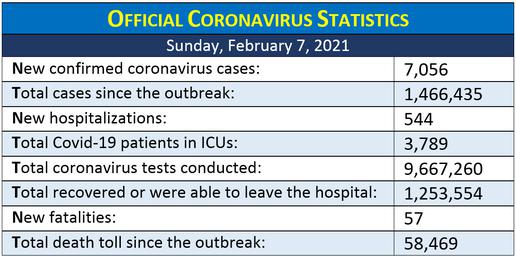Iran is due to start coronavirus vaccinations tomorrow on Tuesday, February 9, using the first shipment of the Russian Sputnik V it received last week. Health Minister Saeed Namaki also reaffirmed that health workers in ICUs would take priority, followed by other frontline mecial staff and high-risk groups including the elderly.
Iran received 20,000 doses of the Russian vaccine last Thursday: enough to vaccinate 10,000 people. The first inoculations are therefore largely symbolic and will be taking place in Tehran, with health officials stating they believe up to 1,000 people could receive the jab.
Over the past few weeks Iranian officials have proffered different start dates for so-called general vaccination, ranging from early spring to early summer.
Clinical Trials of Iran’s Second Homegrown Vaccine Under Way
Iran has unveiled its second domestically-developed Covid-19 vaccine, based on a recombinant protein that can be injected or inhaled. The vaccine, called Cov-Pars, is being made by the Razi Vaccine and Serum Research Institute, Iran’s oldest vaccine development center. It now has received a permit from the Health Ministry to start clinical trials on humans.
According to Kianoush Jahanpour, a spokesman for Iran’s Food and Drug Administration, the vaccine will be tested on 130 volunteers in its first phase of clinical trials. He added that Razi Cov-Pars is an mRNA (messenger RNA) vaccine that reconstructs a harmless piece of the virus’ spike protein.
The vaccine has been developed under the supervision of the Health Ministry and in compliance with standards set by the World Health Organization (WHO), said Saeed Namaki. He added that this product utilizes a combination of an “inhaled dose” and an injection to stimulate the immune system, adding that it has "few side effects" and can be "reconfigured" in the event of virus mutations.
At the unveiling ceremony, Namaki also told the audience that the vaccine could stop the recipient from transmitting the virus to others. Agriculture Minister Kazem Khavazi said animal trials of the vaccine had got under way more than nine months ago and tests were conducted on about 500 animals. “Testing on 25 monkeys was also an unprecedented record and a big undertaking. during which a large number of the Razi institute’s staff contracted the virus,” he said.
Simultaneously, Namaki also reported that Iran’s first vaccine, CovIran-Barekat, has now completed its first phase of human trials – during which the vaccine was administered to just 56 volunteers, including a handful of officials. These trials began in late December and officials have said the initial results will be published in less than a month from now. Hojjat Niki Maleki, head of media for Setad, the parastatal conglomerate controlled by the Supreme Leader that owns Barekat, said two Arab countries have formally asked to purchase the vaccine. He did not name these countries.
Iran’s Latest Coronavirus Statistics
In her daily briefing for February 7, Health Ministry spokeswoman Dr. Sima Sadat Lari announced the official coronavirus statistics for the past 24 hours:

Provinces Round-up
According to the latest figures announced by the Ministry of Health, 36 cities in Iran are now in an orange state of alert, 178 cities are on yellow alert and 234 are rated blue.
In recent weeks Bushehr and its islands has been the destination of choice for travelers escaping the cold in northern Iran. As a result, infections have increased rapidly and this week the alert level of the provincial capital was raised from blue to yellow.
In the past 24 hours alone, 30 new Covid-19 patients, almost one-third of the current total number hospitalized in the province, were admitted to hospitals Bushehr, reported Dr. Saeed Kashmiri, president of Bushehr University of Medical Sciences. Of the 95 Covid-19 patients now in hospital, 18 are in ICUs and with the death of three other coronavirus patients the officially-recorded death toll in the province has reached 861.
In Kurdistan, 41 new cases of Covid-19 were identified and the total number of current hospitalizations in the province reached 111 Twenty-six of these people are in intensive care units, reported Dr. Farzin Rezaei, president of Kurdistan University of Medical Sciences. Since the outbreak of coronavirus 1,062 people in Kurdistan are registered as having lost their lives to Covid-19.
In Alborz, some 267 Covid-19 patients are currently in hospital, 53 of whom were admitted in the past 24 hours, reported Mehrdad Babaei, spokesman for Alborz University of Medical Sciences. He added that as of now, no cases of the more contagious variant of coronavirus identified in England has been detected in the province, but it cannot be definitely ruled out because the symptoms are generally indistinguishable from the earlier strain of the virus. With the death of six more patients in the past 24 hours, the official death toll in Alborz now stands at 2,688.
With the increase in the number of Covid-19 cases in Isfahan in the past two weeks, Dr. Sima Sadat Lari, asked people to avoid traveling to this province. She reported that currently 451 confirmed cases of coronavirus are being treated in Isfahan hospitals and the situation in the province is both “fragile” and “unstable”.
visit the accountability section
In this section of Iran Wire, you can contact the officials and launch your campaign for various problems




























comments